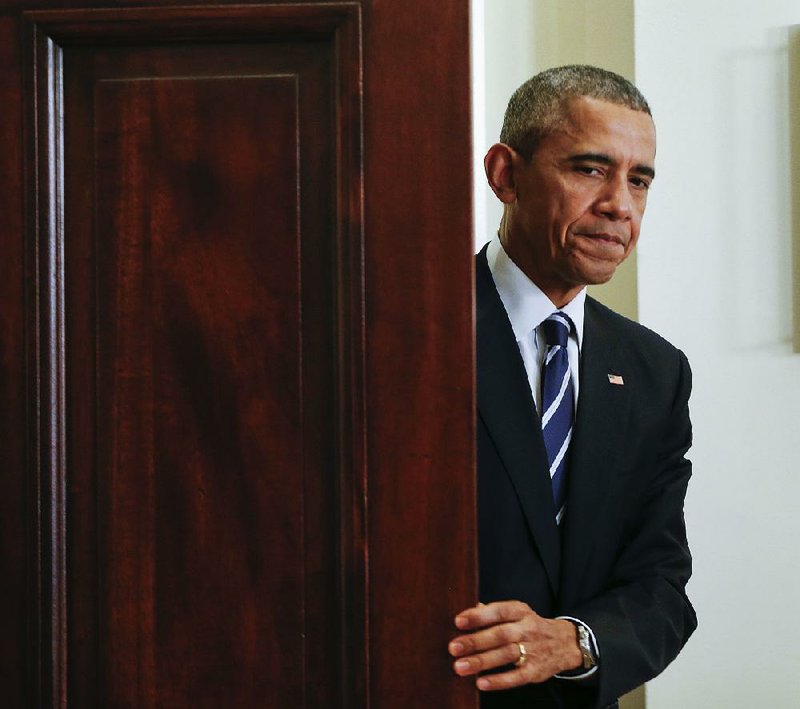WASHINGTON -- President Barack Obama rejected a presidential permit for the proposed Keystone XL pipeline on Friday, declaring it would have undercut U.S. efforts to reach a global-climate-change deal.
The president, announcing his decision at the White House, said he agreed with a State Department conclusion that the 1,179-mile pipeline branch carrying crude oil from Canada wouldn't advance U.S. national interests.
Obama lamented that both major political parties had "overinflated" Keystone into a proxy battle regarding climate change.
"It has become a symbol too often used as a campaign cudgel by both parties rather than a serious policy matter," he told reporters in the Roosevelt Room. He was joined by Vice President Joe Biden and Secretary of State John Kerry.
"This pipeline would neither be a silver bullet for the economy, as was promised by some, nor the express lane to climate disaster proclaimed by others," Obama said.
But he said now is the time to act to "protect the one planet we've got while we still can."
As envisioned, the pipeline would start in Canada's tar sands and head south through Montana, South Dakota and Nebraska, then connect with existing pipelines to carry more than 800,000 barrels of crude oil per day to specialized refineries along the Texas Gulf Coast.
Although Obama in 2013 said he would study the entire Keystone pipeline to determine whether it increased U.S. greenhouse-gas emissions, he didn't broach that topic in his remarks. State Department officials said they had determined Keystone wouldn't significantly affect carbon pollution levels. Instead, the administration cited the "broad perception" that Keystone XL would carry "dirty" oil.
"The point is the old rules said we couldn't promote economic growth and protect our environment at the same time," Obama said, "but this is America, and we have come up with new ways and new technologies to break down the old rules."
The move was made ahead of a United Nations summit on climate change in Paris at the end of the month, when world leaders hopes to help broker a historic agreement committing the world's nations to enacting new policies to counter global warming.
"America is now a global leader when it comes to taking serious action to fight climate change," Obama said in his remarks. "And frankly, approving this project would have undercut that global leadership."
Though environmental groups said Friday was a "day of celebration," Obama's decision was unlikely to be the last word for Keystone XL.
TransCanada, the company behind the proposal, said it remained "absolutely committed" to building the project and was considering filing a new application for permits. The company previously has raised the possibility of suing the U.S. to recoup the more than $2 billion it says it has already spent on development.
"Today, misplaced symbolism was chosen over merit and science. Rhetoric won out over reason," said Russ Girling, TransCanada's chief executive officer.
If TransCanada files a new application, it would likely come during the next president's tenure. The field of candidates for the Republican presidential nomination is unanimous in support of Keystone, while the Democratic candidates are all opposed -- including Hillary Rodham Clinton, who oversaw the early part of the federal review as Obama's first-term secretary of state.
Environmental groups said Obama's rejection of the Keystone XL proposal proved how effective a no-holds-barred advocacy campaign could be.
"President Obama is the first world leader to reject a project because of its effect on the climate," said Bill McKibben, founder of the activist group 350.org, which led the campaign against the pipeline. "That gives him new stature as an environmental leader, and it eloquently confirms the five years and millions of hours of work that people of every kind put into this fight.
"Now every fossil-fuel project around the world is under siege," he said.
Many Democrats and environmental groups latched on to Keystone as just the type of project that must be phased out if the world is to seriously combat climate change. Environmentalists had sought to block construction of the pipeline because it would have provided a conduit for petroleum extracted from the Canadian oil sands. The process of extracting that oil produces about 17 percent more planet-warming greenhouse gases than the process of extracting conventional oil.
Effect on LR Business
U.S. energy industry groups denounced Obama's decision, saying the move hurts jobs, future pipeline projects and companies such as Welspun Tubular Inc. in Little Rock.
Welspun was one of the companies tapped by TransCanada to build the 36-inch-diameter steel pipe needed to complete part of the pipeline. The company, which manufactures oil and gas pipes, created hundreds of miles of pipe for the project at its facility on Frazier Pike and has stored it there while the project was in limbo.
A spokesman for Welspun declined to comment Friday.
When asked about what will happen to pipe built for the Keystone project, Davis Sheremata, a spokesman for TransCanada, said in an email: "We have several hundred miles of pipe (some 435,000 tonnes). We continue to store it and use it for other projects and continue in our belief that much of it will one day be used for Keystone XL."
In 2014, several Arkansas politicians -- including Republican Tom Cotton and Democrat Mark Pryor, who at the time were running competing Senate campaigns -- voiced their support for the Keystone pipeline during a tour of Welspun's plant.
The politicians were shown the 356 miles of pipe sitting at Welspun's storage facility near the Little Rock Port.
Company officials said during the tour that loading the pipe for shipping would add 50 or more jobs and support an additional 200 jobs.
Cotton, in an email statement Friday, voiced frustration at the proposal's rejection.
"The Keystone Pipeline would have been a win for Arkansas' economy in part because of the jobs waiting at Welspun," he said. "It is deeply upsetting the President would put his political interests ahead of these jobs."
Sen. John Boozman, R-Ark., who toured Welspun's Little Rock facility in a separate visit in December, said Friday that he didn't know how Welspun will be affected by the administration's decision.
"I have concerns that it's going to directly impact Arkansas jobs," Boozman said.
Industry members said the decision could place future pipeline projects in jeopardy.
"What this does is it shows the anti-development activist template for how you can set up and run a campaign against a pipeline project and kill it," said Michael Whatley, executive vice president of Consumer Energy Alliance. "This is a model that the anti-pipeline guys are going to be using for a long time to come."
In 2014, 3.4 million barrels per day of oil and other petroleum products flowed into the U.S. from Canada. Much of the oil was shipped by rail.
"The president rejected a real opportunity to create jobs and take advantage of the safest way to transport the energy America needs," said Andrew Black, president and chief executive officer of the Association of Oil Pipe Lines, in a statement.
Ryan: 'It Is Sickening'
Republicans, including House Speaker Paul Ryan of Wisconsin, said Obama had rejected tens of thousands of jobs while railroading Congress.
"This decision isn't surprising, but it is sickening," Ryan said.
But in citing his reasons for the rejection, Obama noted the State Department findings that construction of the pipeline would not have created a significant number of new jobs, lowered oil or gasoline prices, or significantly reduced U.S. dependence on foreign oil.
A State Department analysis concluded that while building the pipeline would have created jobs, the total number represented less than one-tenth of 1 percent of the nation's total employment. The analysis estimated that the Keystone XL would support 42,000 temporary jobs over its two-year construction period -- about 3,900 of them in construction and the rest in indirect support jobs such as food service.
The department estimated that the project would create about 35 permanent jobs.
Republicans and the oil industry had demanded that the president approve the pipeline, which they said would create jobs and stimulate economic growth. Some Democrats, particularly those in oil-producing states such as North Dakota, also supported the project. They accused Obama of hypocrisy for complaining about a lack of U.S. investment in infrastructure while obstructing an $8 billion project.
"A decision this poorly made is not symbolic but deeply cynical," said Sen. Lisa Murkowski, R-Alaska, who leads the Senate Energy and Natural Resources Committee. "It does not rest on the facts -- it continues to distort them."
Sen. John Hoeven, R-N.D., called Obama's decision "not surprising, but it is disappointing."
"It ironic that after delaying construction for more than seven years -- postponing the jobs, revenues and other benefits that would result from the project -- the president now finds it pressing to make a decision just as the company is asking for a pause to resolve any concerns," Hoeven said. "Clearly, the administration is making a political decision when it comes to Keystone, rather than following the legal and regulatory process."
TransCanada first applied for Keystone permits in September 2008 -- shortly before Obama was elected.
Most pipelines wait roughly 1½ years for permits to cross the U.S. border, but Keystone's review took more than five times longer average, according to an Associated Press analysis.
The first major delay came in 2011, when Obama postponed a decision until after his re-election, citing uncertainty about the proposed route through Nebraska. When Congress passed legislation requiring a decision within 60 days, he rejected the application but allowed TransCanada to reapply. In 2014, he delayed a decision again -- this time indefinitely.
Obama's decision on Friday risks creating a fresh point of tension in his relationship with Canada's new government. After speaking by phone with Obama on Friday, newly installed Canadian Prime Minister Justin Trudeau said he was "disappointed by the decision" but pledged to pursue a "fresh start" with Obama nevertheless.
Information for this article was contributed by Josh Lederman, Julie Pace, Matthew Daly, Kathleen Hennessey, Matthew Lee and Rob Gillies of The Associated Press; by Coral Davenport of The New York Times; by Juliet Eilperin and Steven Mufson of The Washington Post; and by Jessica Seaman of the Arkansas Democrat-Gazette.
A Section on 11/07/2015

